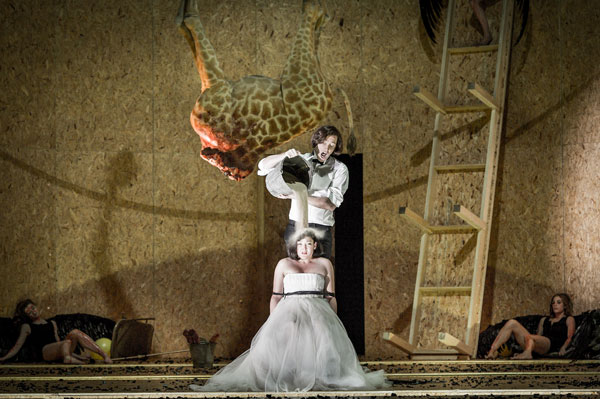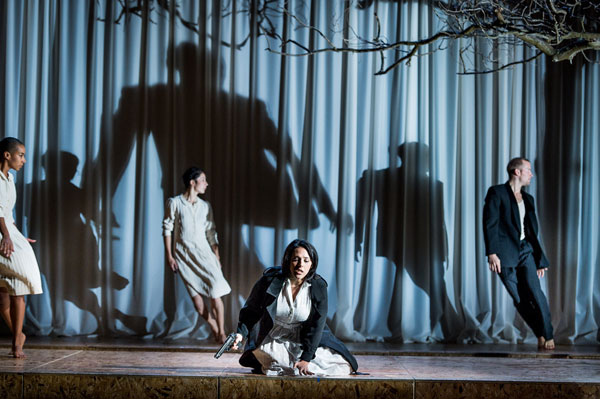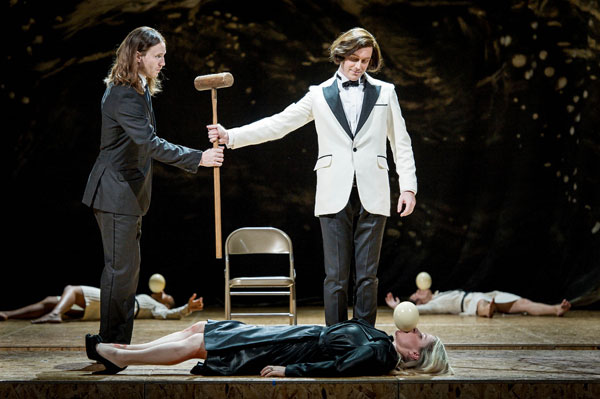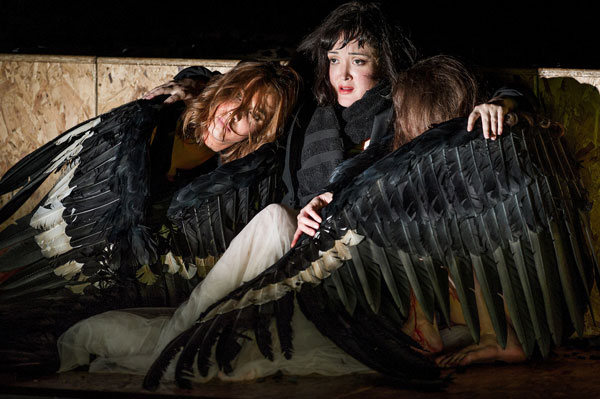I would never have imagined Caesar in cowboy boots. Having said that, nor would I have pictured Ptolemy (Cleopatra’s petulant yet brutal younger brother) wielding a croquet bat as his weapon of choice. The respective rulers of Rome and Egypt have certainly undergone makeovers in the ENO’s current rendition of Handel’s 1724 opera, Julius Caesar, and it’s no bad thing. The tale is brimming with plotting, power struggles, murder, war, love and lust, and these have been taken out of their Baroque finery into a stark, somewhat peculiar setting that is perplexing at times, but captivating.

The scene is set with Caesar arriving in Egypt, victorious in battle over Pompey whose wife and daughter (although it’s usually a son), Sesto, come to swear allegiance to the conqueror. All seems to be going nicely until Achillas, right-hand man to Ptolemy, arrives with Pompey’s severed head as a gift for Caesar. This attempt to suck up to him goes down like a lead balloon (literally – the head’s darn heavy when it’s dropped on the floor) and Caesar vows to punish this barbarity by killing Ptolemy. Sesto wants to kill him too so as to avenge her father’s death. Cleopatra has always wanted him deposed anyway (old conventions forced them to rule together) and so will conspire with anyone who is willing. So it all gets rather messy and lots of people try to kill lots of other people, or themselves. Somewhere in the midst of the madness, Cleopatra and Caesar fall in love, which we all knew would happen, but I hadn’t expected the Roman Emperor to woo his sweetheart wearing a dinner jacket and boxers, toting a bunch of helium balloons.
Michael Keegan-Dolan’s production is in association with the Fabulous Beast Dance Theatre and so his choreography tells the story as well as his direction. The dancers are onstage most of the time, leaving the singers to focus on the actual singing. The dancing has a couple of Njinskyesk moments when the crowds jump in repetitive, outraged forms, and there are elements of Pina Bausch in the intuitively supple and abstract movements. Generally, it is very effective, capturing the moods and raising tensions with both subtlety and force. In fact, the dancers are so enthralling that I occasionally found myself focussing on them rather than the music, which is slightly ironic since their purpose is to allow the singers to do their job unhindered by physical preoccupations. That said, this plain style of delivery from the chorale is very effective and easy to take in – there’s very little clenching of fists, contorted faces or throwing oneself to the ground. One of the most moving moments was Cleopatra’s aria “Flow my tears” at the end of Act II, performed by Anna Christy standing still at the front of the stage, spotlight on, background dark – nothing more – and it was simply stunning.

Christy has an incredibly pretty voice – clear as a bell up top – which is particularly affecting with added fervour. Yet I wonder whether the Queen of Egypt might benefit from a little more roundness in her tone. This is the most beguiling woman imaginable, a conniving queen with power and resolve and cunning; her seductiveness might have been more plausible with slightly greater depth. On the other hand, we see another side of her here – in addition to the coquettish siren, we see a youthful, more vulnerable Cleopatra who is fraught in perpetual battle with her tiresome brother and needs rescuing by Caesar. Cleopatra and Ptolemy are distinct from the others by the grey cardigans that they wear over the white costumes donned by the entire cast. This immediately makes them look like rejects from the Famous Five and you get a sense of a ridiculous battle between brother and sister, each stamping their feet because they want to wear the crown. Come the third act, the abandoned battle scene looks like a playroom in disarray, the discarded toys the debris from the ultimate sibling rivalry.
Tim Mead’s Ptolemy is a complete triumph. At times he seems like a bored, spoilt brat looking for entertainment, at others a mildly dangerous fool, and sometimes he strides the stage with an air of such wanton cruelty that you join the rest of the characters in praying for his swift demise. He cuts a slim figure (made all the more creepy by his long hair and uptight turtlenecks) and comes across as sadistic and repressed, with a whiff of effeminate eccentricity. There is something very tragic about him (especially when he tries to emulate his mighty rival Caesar by donning cowboy boots and a Stetson) but also something terrifying; in making his servant girls stand on chairs to then ducktape shut their mouths and force them to gyrate in bizarre dance moves until they cry, he appears as a twisted monster. And yet he sings so sweetly that you always want to hear more. He delivers lines full of venom with such a saccharine tone that he reaches Bond villain levels of evil.

His sidekick is pretty good too, although it’s a shame that you don’t get to hear more of Andrew Craig Brown’s deep and rich Achillas. A couple of his arias were the victims of conductor Christian Curnyn’s cull, which mostly got rid of surplus recitative and actually made for a nice sprightly pace, so you win some, lose some.
Lawrence Zazzo’s Caesar swaggers on commanding exactly the presence an emperor should, and promptly shoots a crocodile just in case you weren’t sure. The remarkable expression on his face and in his voice allows him to create moments both comic and heartrending, and you never have a moment’s pause to worry that he won’t sail through Handel’s fiendish embellishments with anything other than style. I was completely sold.
Interpretive dance, minimalist staging and animalistic-rituals will never be everybody’s cup of tea and I must admit to feeling, occasionally, somewhat baffled by elements of this production. Perhaps I just didn’t get the joke, perhaps the symbolism was clumsily drawn, but it ultimately didn’t matter. The music is sublime – Handel has the ability to make it seem as though everything is right with the world – and his score is played with effortless zing from start to finish. Whatever little quibbles you could find with the vocal performances, you feel in totally safe hands here and it is refreshing to experience this exceptional work in something far away from the normal comfort zones.
Julius Caesar at the ENO runs until Friday 2nd November. For more information and to book tickets, visit the website.




